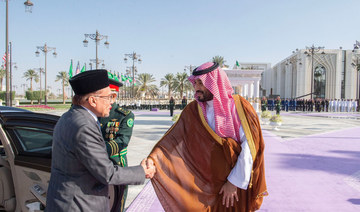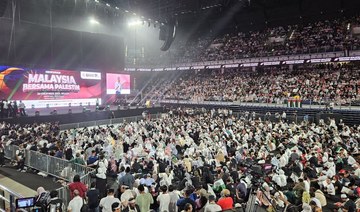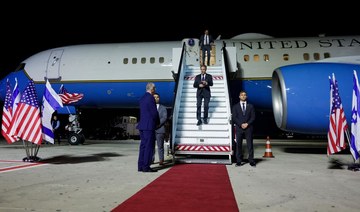AT-TUWANI, West Bank: Young American rabbinical students are doing more than visiting holy sites, learning Hebrew and poring over religious texts during their year abroad in Israel.
In a stark departure from past programs focused on strengthening ties with Israel and Judaism, the new crop of rabbinical students is reaching out to the Palestinians. The change reflects a divide between Israeli and American Jews that appears to be widening.
On a recent winter morning, Tyler Dratch, a 26-year-old rabbinical student at Hebrew College in Boston, was among some two dozen Jewish students planting olive trees in the Palestinian village of At-Tuwani in the southern West Bank. The only Jews that locals typically see are either Israeli soldiers or ultranationalist settlers.
“Before coming here and doing this, I couldn’t speak intelligently about Israel,” Dratch said. “We’re saying that we can take the same religion settlers use to commit violence in order to commit justice, to make peace.”
Dratch, not wanting to be mistaken for a settler, covered his Jewish skullcap with a baseball cap. He followed the group down a rocky slope to see marks that villagers say settlers left last month: “Death to Arabs” and “Revenge” spray-painted in Hebrew on boulders and several uprooted olive trees, their stems severed from clumps of dirt.
This year’s student program also includes a tour of the flashpoint West Bank city of Hebron, a visit to an Israeli military court that prosecutes Palestinians and a meeting with an activist from the Hamas-controlled Gaza Strip, which is blockaded by Israel.
The program is run by “T’ruah: The Rabbinic Call for Human Rights,” a US-based network of rabbis and cantors.
Most of T’ruah’s membership, and all students in the Israel program, are affiliated with the Reform, Reconstructionist and Conservative movements — liberal streams of Judaism that represent the majority of American Jews. These movements are marginalized in Israel, where rabbis from the stricter Orthodox stream dominate religious life.
The T’ruah program, now in its seventh year, is meant to supplement students’ standard curricular fare: Hebrew courses, religious text study, field trips and introductions to Jewish Israeli society. Though the program is optional, T’ruah says some 70 percent of the visiting American rabbinical students from the liberal branches of Judaism choose to participate.
The year-long program is split into one semester, focused on Israel’s occupation of the West Bank, and another, on alleged human rights abuses inside Israel.
T’ruah claims its West Bank encounters aren’t one-off acts of community service, but experiences meant to be carried home and disseminated to future congregations.
“We want to propel them to action, so they invite their future rabbinates to work toward ending the occupation,” said Rabbi Ian Chesir-Teran, T’ruah’s rabbinic educator in Israel.
The group began its trip in the most Jewish of ways, a discussion about the weekly Torah portion that turned into a spirited debate about the Ten Commandments.
“The Torah says don’t covet your neighbor’s fields, and we’re going to a Palestinian village whose private land has been confiscated for the sake of covetous Jews building settlements,” Chesir-Teran said.
As their bus trundled through the terraced hills south of Hebron, students listened to a local activist’s condensed history of the combustible West Bank, which Israel captured in the 1967 Mideast war.
As part of interim peace deals in the 1990s, the West Bank was carved up into autonomous and semi-autonomous Palestinian areas, along with a section called Area C that remains under exclusive Israeli control.
The destinations of the day — the Palestinian villages of At-Tuwani and Ar-Rakkes — sit in Area C, also home to around 450,000 Israeli settlers. Palestinians seek all of the West Bank as the heartland of a hoped-for independent state.
The group was guided by villagers to their olive trees — an age-old Palestinian symbol and a more recent casualty of the struggle for land with Israeli settlers.
Israeli security officials reported a dramatic spike last year in settler violence against Palestinians.
Yishai Fleisher, a settler spokesman, blamed the attacks on the “atmosphere of tension” in the West Bank. “We’re against vigilantism, unequivocally,” he said.
As Israeli soldiers watched from the hilltop, Palestinians and Jews dug their fingers into the crumbling soil, setting down roots where holes torn out of the field hinted at recent vandalism.
Dratch said he came of age in Pennsylvania during the violent years of the second Palestinian uprising in the early 2000s. “My religious education was steeped in fear of Palestinians,” he said.
But in college, Dratch’s ideas about Israel changed. Dratch says he still supports Israel, while opposing its policies in the West Bank. “I realized I could be Zionist without turning my back on my neighbor, on Palestinians,” he said.
With hundreds of young American rabbis sharing such sentiments, some in Israel find the trend alarming.
“I worry about a passion for social justice becoming co-opted by far-left politics among future American Jewish leaders,” said Yossi Klein Halevi, a senior fellow at the Shalom Hartman Institute, a Jewish research center in Jerusalem.
“Future rabbis are marginalizing themselves from the overwhelming majority of Israeli Jews,” he added.
As Israel heads toward elections in April, opinion polls point to another victory for Prime Minister Benjamin Netanyahu and his religious, nationalist allies.
In the US, meanwhile, surveys show American Jews, particularly the younger generation, holding far more dovish views toward Palestinians and religious pluralism. Netanyahu’s close friendship with President Donald Trump has further alienated many American Jews, who tend to vote overwhelmingly Democratic.
Two weeks after visiting At-Tuwani, the group received disheartening news: half of the 50 trees they’d planted had been uprooted, apparently by settlers. The students scrambled to make plans to replant.
Dratch said that while his time in Israel has provided him with plenty of reasons to despair, he still harbors hope for change.
“We’ll be sharing these stories to give people a full picture of what it means to care about this place,” he said.
Future rabbis plant with Palestinians, sow rift with Israel
Future rabbis plant with Palestinians, sow rift with Israel

- The gap between American and Israeli Jews seems to be widening
- American rabbinical students plant olive trees in a Palestinian village
Houthis claim Red Sea victory against US Navy

- Militia forces lack technical or military capability to achieve their objectives in the Mediterranean, analyst says
AL-MUKALLA: The Houthis have reiterated a warning of strikes against ships bound for or with links to Israel — including those in the Mediterranean — as they claimed victory against the US Navy in the Red Sea.
The Houthi-controlled SABA news agency reported that the fourth phase of the militia’s pro-Palestine campaign would involve targeting all ships en route to Israel that came within range of their drones and missiles, noting that the US, UK, and other Western navies “stood helpless” in the face of their attacks.
“The fourth phase demonstrates the striking strength of the Yemeni armed forces in battling the world’s most potent naval weaponry, the American, British and European fleets, as well as the Zionist (Israel) navy,” SABA said.
Houthi military spokesman Yahya Sarea said on Friday strikes against Israel-linked ships would be expanded to the Mediterranean. Attacks would be escalated to include any companies interacting with Israel if the country carried out its planned attack on the Palestinian Rafah.
Since November, the Houthis have launched hundreds of ballistic missiles and drones at commercial and navy vessels in the Red Sea, Bab Al-Mandab Strait and the Gulf of Aden. They claim attacks are only aimed at ships linked with Israel in a bid to force an end to its siege on the Gaza Strip.
They have also fired at US and UK commercial and navy ships in international waters off Yemen after the two countries launched strikes against Houthi-controlled areas.
On Saturday, Houthi information minister Dhaif Allah Al-Shami claimed the US was forced to withdraw its aircraft carrier and other naval ships from the Red Sea after failing to counteract attacks. He added new offensives would begin against Israeli ships in the Mediterranean in the coming days.
“They failed badly. Yemeni missiles and drones beat the US Navy, and its military, cruisers, destroyers and aircraft carriers started to retreat from our seas,” Al-Shami said in an interview with Lebanon’s Al-Mayadeen TV news channel.
Yemen specialists have disputed Houthi assertions that they have military weapons capable of reaching Israeli ships in the Mediterranean.
Brig. Gen. Mohammed Al-Kumaim, a Yemeni military analyst, told Arab News on Sunday the Houthis would only be able to carry out such attacks if they had advanced weaponry. He said the Houthis were expanding their campaign against ships to avoid growing public resentment in areas under their control after the militia had failed to pay public employees and repair services.
Al-Kumaim added the Houthis might claim responsibility for an attack on a ship in the Mediterranean which was carried out by an Iran-backed group operating in the region.
“Theoretically and technologically, the Houthis lack any technical or military capability to achieve their objectives (in the Mediterranean),” Al-Kumaim said.
Jordanian-Iraqi economic forum begins at Dead Sea resort

- A specialized session will focus on investment prospects in various economic sectors
AMMAN: Jordanian Minister of Investment Kholoud Saqqaf opened the Economic Forum for Financial, Industrial, and Commercial Partnerships between Iraq and Jordan on Sunday.
The forum, which is organized jointly by the Iraqi Business Council in collaboration with the Jordan and Amman chambers of industry, aims to strengthen economic ties between the two countries.
Held at the King Hussein Convention Center on the shores of the Dead Sea, the forum is the largest regional gathering for fostering economic cooperation between Jordan and Iraq, Jordan News Agency reported.
Over two days, the event will promote regional integration by facilitating economic connectivity and encourage collaboration across sectors.
Discussions will cover investment opportunities in Jordan and Iraq, prospects for commercial and industrial ventures, economic modernization initiatives, and opportunities in Jordan’s free and development zones.
Key figures attending include Kamel Dulaimi, the Iraq president’s chief of staff, ministers from Jordan and Iraq, as well as business leaders, investors and representatives from Arab and foreign companies.
Discussions are expected to focus on the banking sector’s role in providing financial support, while highlighting success stories from investment companies in both countries.
A specialized session will focus on investment prospects in various economic sectors, with a particular emphasis on mining and industry.
At the opening, Saqqaf highlighted investment prospects displayed on the Invest in Jordan platform, which align with the kingdom’s Economic Modernization Vision.
Meanwhile, Iraqi Minister of Industry and Mineral Resources Khaled Battal Al-Najm drew attention to his country’s industrial strategy and plans for a joint economic zone with Jordan, alongside efforts to address unemployment and attract foreign investment, especially in mining.
Dulaimi emphasized the significance of Iraqi President Abdul Latif Rashid’s recent visit to Jordan, underscoring discussions aimed at strengthening ties and enhancing economic systems to facilitate investment projects.
UAE delivers 400 tonnes of food aid to Gaza
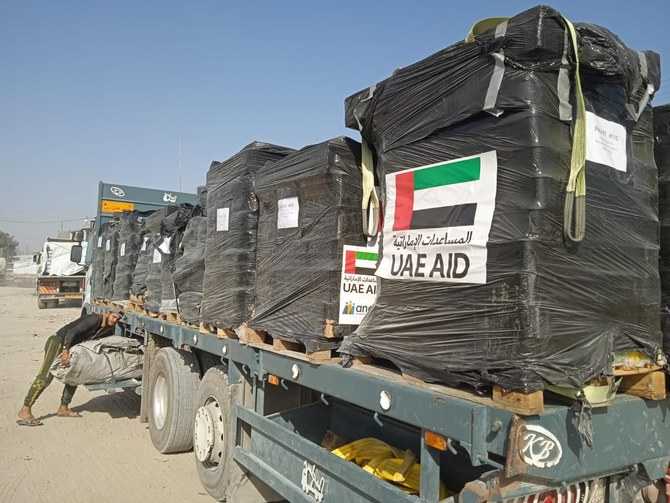
- Delivery, specifically for the northern areas of the enclave, is enough to feed about 120,000 people
DUBAI: The UAE, in partnership with American Near East Refugee Aid, announced on Sunday that it had delivered 400 tonnes of food aid to Gaza.
The delivery, specifically for the northern areas of the enclave, is enough to feed about 120,000 people, Emirates News Agency reported.
Reem Al-Hashimy, Emirati minister of state for international cooperation, said: “The UAE’s safe and successful delivery and distribution of food relief to the Gaza Strip, especially the northern Gaza Strip, marks a significant scaling up in action.”
She continued: “We remain firmly committed to our position of solidarity with the brotherly Palestinian people and alleviating suffering in the Gaza Strip. The UAE, working in parallel with international partners, is determined more than ever to intensify all efforts to ensure that aid lifelines get to those who need it the most.”
Sean Carroll, CEO of ANERA, thanked the Emirati government for its assistance in getting the much-needed aid to the Palestinian people.
“ANERA and the people we serve are extremely grateful for support from the government and people of the UAE, that allows us to deliver this food to northern Gaza, where the needs are so great,” he said.
Last month the UAE allocated $15 million under Cyprus’s Amalthea Fund to bolster aid efforts in Gaza.
Meanwhile, the Gulf country continues to collaborate with international partners and organizations to enable the effective delivery of food and relief via land, air and sea.
To date, the UAE has dispatched more than 31,000 tonnes of humanitarian supplies, including food, relief items and medical supplies, using 256 flights, 46 airdrops, 1,231 trucks, and six ships.
The UAE has embarked on several sustainable relief projects to ensure a consistent supply of food and water to the people of Gaza.
These initiatives include the establishment of five automatic bakeries, the provision of flour to eight existing bakeries, and the installation of six desalination plants with a combined capacity of 1.2 million gallons of water a day.
Malaysian PM condemns West’s ‘sheer hypocrisy’ over Gaza war

- Anwar Ibrahim spoke on a wide range of topics in interview during recent visit to Riyadh
- He pointed out Malaysia had “issued statements to demand that the Gaza genocide must end”
DUBAI: Malaysia takes a strong stance on the war in Gaza and condemns the “sheer hypocrisy” of Western countries over the ongoing Israeli killing of Palestinian women and children, Prime Minister Anwar Ibrahim has said.
Speaking to Katie Jensen, host of the Arab News current affairs program “Frankly Speaking,” during a visit to Riyadh for a special meeting of the World Economic Forum last week, he said that a failure to prevent genocide in Gaza could foster extremism.
“We have issued statements to suggest that their genocide must end,” Anwar said in an interview that can be read in full on page 3.
“And it’s sheer hypocrisy for countries, some countries in the West, including the United States, to deny these continued killings of children and women and civilians.
“Whatever your political position is, I don’t believe that in this period we can condone these sort of inhuman, barbaric acts against fellow human beings. And I think that position is clear. Our position is very strong in that direction.
“I know for an emerging, developing country, it may sound a bit too harsh, but then how do you condone continued killings of women and children? There’s no other way except to at least express in the very strongest terms possible.
“I appreciate the role of the Arab neighbors and Turkiye and Iran and all these other countries trying to do their part. And I think we in Malaysia and many other countries outside the region, too, are expressing gross concern because people are feeling enraged.
“And we don’t want this to prolong, because it will only lead to groups to foster fanatical extremist or terrorist action in the absence of the failure of the international community.”
According to recent reports, the prosecutor of the International Criminal Court may soon issue warrants for the arrest of Israeli Prime Minister Benjamin Netanyahu and Defense Minister Yoav Gallant on charges of deliberately starving Palestinians in Gaza.
If the ICC rules that genocide is taking place in Gaza, Anwar said he would support calls for the arrest of the Israeli ministers.
“I don’t believe that any reasonable person could dispute the incontrovertible effects adduced to support their allegation that genocide has been committed,” he said. “Once it is established that genocide happened, then of course the warrants have to be issued.”

In Kuala Lumpur, a trial is currently taking place after an Israeli national was arrested on March 28 suspected of entering Malaysia to assassinate a compatriot. He was found in possession of six guns and some 200 rounds of ammunition.
The case has raised speculation as to whether the man, named by local authorities as Shalom Avitan, was in fact a spy.
Asked whether any proof had been found connecting the Israeli national to espionage or organized crime, Anwar said investigations were ongoing.
“They have not established the fact that whether this criminal is a spy, but certainly the actions, the movements, the amount of weapons and the link networking within the country is of course concerning,” he said.
“And the authorities are taking tough measures to make sure they get to the bottom of it.”
On whether an independent Palestinian state is likely to come to fruition this year from the ashes of the Gaza war, Anwar said no country — including the US — has the right to deny the resounding global support for Palestinian statehood.
“There are 139 countries that have given recognition to the state of Palestine,” he said. “Now, why must one or two countries consider them above all these considerations and refuse to accept this?
“And to my mind, it is dishonorable to deny the right, not only of Palestinians but of the international community when they decide after years or decades of deliberations, looking at the facts, looking at historical decisions, looking at the precarious position now on the issue of security of the region, issue of economic progress.
“After all these considerations, 139 say, yes, we must recognize the existence of the state of Palestine. I don’t believe any country has the right to deny the sentiments, aspirations of the world.”
Netanyahu says ending Gaza war now would keep Hamas in power
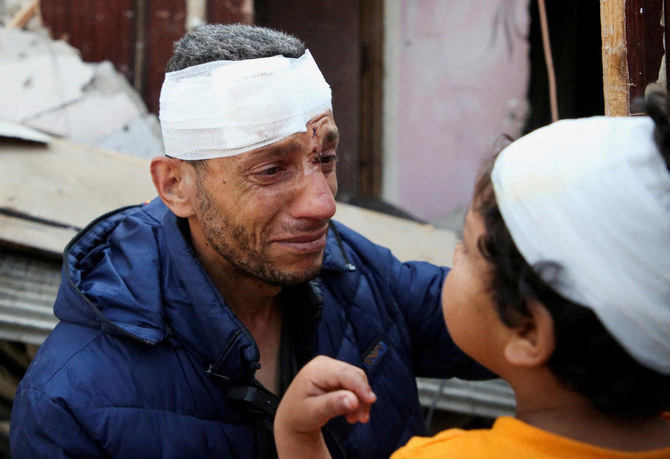
- Israeli leader hardens his rejection of Hamas demands for an end to the Gaza war in exchange for the freeing of hostages
JERUSALEM: Prime Minister Benjamin Netanyahu hardened his rejection of Hamas demands for an end to the Gaza war in exchange for the freeing of hostages, saying on Sunday that would keep the Palestinian Islamist group in power and pose a threat to Israel.
Netanyahu said Israel was willing to pause fighting in Gaza in order to secure the release of hostages still being held by Hamas, believed to number more than 130.
“But while Israel has shown willingness, Hamas remains entrenched in its extreme positions, first among them the demand to remove all our forces from the Gaza Strip, end the war, and leave Hamas in power,” Netanyahu said.
“Israel cannot accept that.”
“Hamas would be able to achieve its promise of carrying out again and again and again its massacres, rapes and kidnapping.”
In Cairo, Hamas leaders held a second day of truce talks with Egyptian and Qatari mediators, with no apparent progress reported as the group maintained its demand that any agreement must end the war in Gaza, Palestinian officials said.
The war began after an assault by Hamas on southern Israel on Oct. 7 in which 1,200 people were killed and 252 hostages taken, according to Israeli tallies.
Israel’s ensuring military offensive has killed more than 34,600 Palestinians, according to the health ministry in the Hamas-ruled Gaza. The bombardment has devastated much of the coastal enclave and caused a humanitarian crisis.










